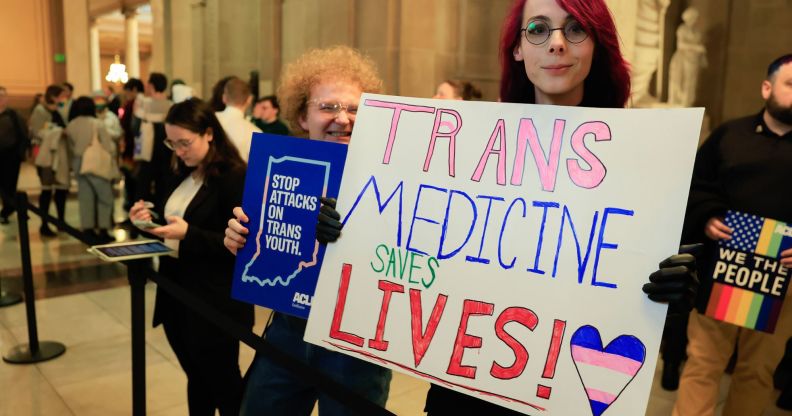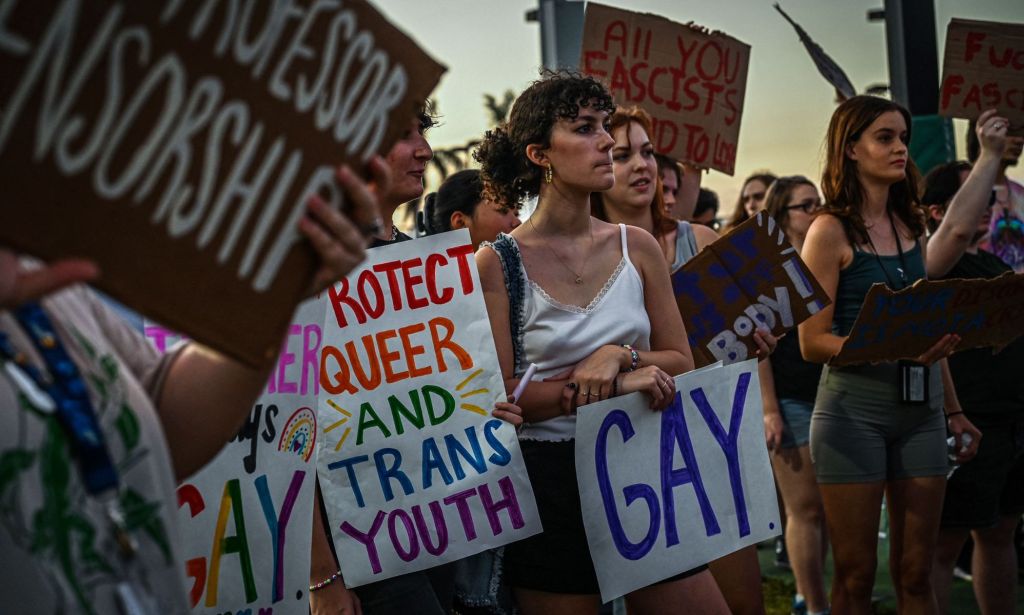Gay Republican gives emotional speech after Missouri passes two anti-trans bills

Several studies have found gender-affirming healthcare is life-saving for trans people. (Getty)
A gay Missouri Republican is questioning his future in the party after it passed two anti-trans bills in once day.
The bills, one proposing a ban on gender-affirming care for young people, the other anti-trans sports legislation, were approved on Wednesday (10 May), and will now head to Republican governor Mike Parson, who is expected to sign them into law, CNN reported.
Parson tweeted after the bill passed: “All children, regardless of their gender or orientation, are invaluable and should not be subjected to potentially irreversible surgeries and treatments prior to adulthood.”
Under-18s are not routinely offered gender-affirming surgeries anywhere in the US.
The bills have even attracted criticism from lawmakers, with openly gay representative Chris Sander claiming he was now questioning whether he is still a Republican after his GOP colleagues approved the bills.
“If we were protecting children, we would do something to provide mental health [support] to children,” he said. “It also takes away rights of adult who are 18 or older…
“We just want to be discriminating and unwelcoming to people around the world. We also want to tell people who live here: get out of our state, we don’t care about you.
“That’s party politics. I’m LGBTQ, questioning my party at the moment. I’m not questioning me being a gay Republican, I’m questioning if I’m a Republican.”
Missouri’s anti-trans bills explained
The anti-trans healthcare bill, SB49, would prevent physicians from performing gender-affirming surgeries or prescribing hormone therapy to minors.
It follows a “terrifying” attempt by Republican attorney general Andrew Bailey to restrict almost all gender-affirming care for both minors and adults.
Bailey issued an emergency order on 13 April to put severe limitations on receiving gender-affirming care for all ages, including requirements of three years of medically documented gender dysphoria and mandated therapy.
It would also limit gender-affirming care for autistic people, or people with depression or anxiety.
The rule, which was to come into effect on 27 April, has been temporarily blocked by a judge, but trans people in the state have warned that if it prevails, it could lead to a “mass detransitioning”.
Journalist Erin Reed, who tracks anti-trans legislation, tweeted that what she has been “terrified of for the last three years [has] officially begun”.

The second bill, SB39, seeks to prohibit public and private schools, including colleges, from allowing students to take part in athletic competitions in teams that do not match the sex recorded on their birth certificate.
It would also ban students from competing against a team without such a policy.
The American Civil Liberties Union of Missouri, which sued to block the state’s ban on adults receiving gender-affirming care, said the two new laws would “devastate” trans people.
“Gender-affirming care saves lives,” the organisation said. “Politicians’ intentional choice to abuse transgender Missourians will devastate trans people and their families.
“Both bans attempt to erase transness from Missouri. Every person in the state should be alarmed by this weaponisation of the government to intimidate people through the denial of basic health care and exclusion from extracurricular activities.”
The bills follow Missouri’s so-far-unsuccessful attempt to introduce a version of Florida’s Don’t Say Gay law that would stop teachers and school staff from having conversations regarding sexuality and gender identity with students.
The bill has been described as the most extreme of its kind in the US, leaving Shira Berkowitz, the senior director of public policy and advocacy for LGBTQ+ organisation Promo, warning that “[it] is written broadly enough that you can’t talk or read about human relationships at all”.
Research by the Human Rights Campaign found that Americans are growing increasingly opposed to extreme anti-LGBTQ+ bills.
The poll showed that 64 per cent of voters think there is “too much legislation” [aimed at] limiting the rights of transgender and gay people in America”, and that nearly 58 per cent of those surveyed oppose laws that would restrict drag performance.
How did this story make you feel?

